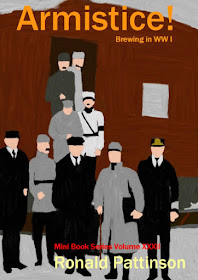There was quite a change in the rate of attenuation. My guess is that they were trying to compensate for the fall in gravity. In 1918, with gravities under 1025º, they were really pushing the limits of what you could call beer. Because of the rules about average gravity, every barrel they brewed at 1021º meant they could brew one at 1039º, or a half barrel at 1047º. It was very tempting to slash the gravity of a big seller like Mild to maximise the amount of stronger, more profitable beer you could brew.
It’s interesting to note that the hopping rate per barrel remaining fairly constant at around 1 pound per barrel when the gravity was more than halved. That’s reflected by the increase in the hopping rate per quarter, which rose from 4-5 lbs to over 10 lbs. Again, I assume that to compensate for the fall in gravity and boost flavour.
The grist was tweaked several times during the war years:
The big increase in the proportion of crystal malt from 1917 on is intriguing. As it seems to correlate with the fall in gravity. It looks like another attempt to compensate for the falling strength of X Ale. While the appearance of black malt corresponds to a fall in the percentage of No. 3 invert sugar. So it’s surely a colour correction.
The 1920 recipe is quite different from the 1914 one: far less base malt, slightly more No. 3 invert, almost three times as much crystal malt.
| Courage X Ale 1914 - 1920 | |||||||
| Date | Year | OG | FG | ABV | App. Atten-uation | lbs hops/ qtr | hops lb/brl |
| 17th Oct | 1914 | 1054.6 | 1019.4 | 4.65 | 64.47% | 4.96 | 1.05 |
| 8th Mar | 1915 | 1049.9 | 1018.3 | 4.18 | 63.33% | 4.00 | 0.78 |
| 23rd Sep | 1915 | 1048.2 | 1011.1 | 4.91 | 77.01% | 4.96 | 0.96 |
| 11th Oct | 1916 | 1048.2 | 1007.2 | 5.42 | 85.06% | 5.00 | 0.97 |
| 9th May | 1916 | 1044.9 | 1006.9 | 5.02 | 84.57% | 6.51 | 1.18 |
| 2nd Jan | 1917 | 1045.7 | 1010.0 | 4.73 | 78.18% | 3.88 | 0.76 |
| 8th Jun | 1917 | 1041.6 | 1007.2 | 4.54 | 82.67% | 8.72 | 1.16 |
| 19th Oct | 1917 | 1034.6 | 1006.4 | 3.74 | 81.60% | 7.57 | 1.13 |
| 18th Jan | 1918 | 1034.6 | 1006.9 | 3.66 | 80.00% | 7.38 | 1.13 |
| 20th Apr | 1918 | 1023.8 | 1004.4 | 2.57 | 81.40% | 9.41 | 1.01 |
| 19th Nov | 1918 | 1021.1 | 1003.9 | 2.27 | 81.58% | 10.89 | 1.01 |
| 30th Jun | 1919 | 1023.5 | 1003.6 | 2.64 | 84.71% | 6.78 | 0.75 |
| 7th Jul | 1919 | 1027.4 | 1004.4 | 3.04 | 83.84% | 8.17 | 0.99 |
| 29th Dec | 1919 | 1037.7 | 1007.2 | 4.03 | 80.88% | 5.98 | 1.00 |
| 22nd Apr | 1920 | 1037.7 | 1007.5 | 3.99 | 80.15% | 5.91 | 0.98 |
| Sources: | |||||||
| Courage brewing records held at the London Metropolitan Archives, document numbers ACC/2305/08/247, ACC/2305/08/248, ACC/2305/08/249, ACC/2305/08/250 and ACC/2305/08/251. | |||||||
| Courage X Ale grists 1914 - 1920 | |||||||||
| Date | Year | OG | pale malt | black malt | crystal malt | no. 3 sugar | caramel | glucose | black invert |
| 17th Oct | 1914 | 1054.6 | 82.1% | 0.8% | 6.1% | 11.0% | |||
| 8th Mar | 1915 | 1049.9 | 82.8% | 6.1% | 11.1% | ||||
| 23rd Sep | 1915 | 1048.2 | 82.4% | 6.3% | 11.3% | ||||
| 11th Oct | 1915 | 1048.2 | 82.8% | 6.1% | 11.1% | ||||
| 9th May | 1916 | 1044.9 | 80.5% | 6.0% | 13.4% | ||||
| 2nd Jan | 1917 | 1045.7 | 75.0% | 9.1% | 15.9% | ||||
| 8th Jun | 1917 | 1041.6 | 73.6% | 11.3% | 15.1% | ||||
| 19th Oct | 1917 | 1034.6 | 76.2% | 1.7% | 13.3% | 6.6% | 2.2% | ||
| 18th Jan | 1918 | 1034.6 | 76.1% | 1.7% | 13.0% | 9.2% | |||
| 20th Apr | 1918 | 1023.8 | 70.9% | 2.9% | 18.4% | 7.8% | |||
| 19th Nov | 1918 | 1021.1 | 64.5% | 5.4% | 19.4% | 10.8% | |||
| 30th Jun | 1919 | 1023.5 | 66.3% | 2.0% | 15.3% | 13.6% | 2.7% | ||
| 7th Jul | 1919 | 1027.4 | 67.6% | 2.0% | 15.4% | 13.7% | 1.4% | ||
| 29th Dec | 1919 | 1037.7 | 64.4% | 19.8% | 15.8% | ||||
| 22nd Apr | 1920 | 1037.7 | 69.1% | 16.7% | 13.2% | 1.0% | |||
| Sources: | |||||||||
| Courage brewing records held at the London Metropolitan Archives, document numbers ACC/2305/08/247, ACC/2305/08/248, ACC/2305/08/249, ACC/2305/08/250 and ACC/2305/08/251. | |||||||||
The above is an excerpt from Armistice!, which takes a detailed look at the exciting world of WW I brewing. Including some of the most watery beer recipes ever.
Buy this wonderful book.


No comments:
Post a Comment